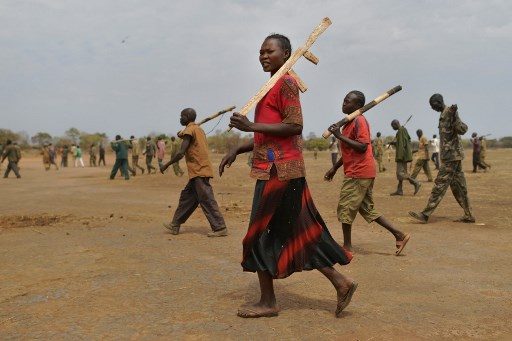SUMMARY
This is AI generated summarization, which may have errors. For context, always refer to the full article.

JUBA, South Sudan – South Sudan rebels rejected on Sunday, February 16, a peace offer by President Salva Kiir to return to a system of 10 states, paving the way for a unity government.
The rejection by rebel chief Riek Machar dashes hopes of breaking a deadlock and ending a 6-year conflict that has left at least 380,000 people dead and millions in dire poverty.
Kiir and Machar – who lives in exile – are under increasing international pressure to resolve their differences by a February 22 deadline.
Kiir on Saturday, February 15, said the country would now be divided among the original 10 states – a key opposition demand – plus 3 “administrative areas” of Pibor, Ruweng and Abyei.
But rebel leader Riek Machar said Sunday he objected to the 3 administrative areas.
It “cannot be referred to as reverting to 10 states (and) as such cannot be accepted,” Machar wrote in a statement.
“We therefore call upon President Kiir to reconsider this idea of creating administrative areas,” he added.
Machar warned the 3 areas risked causing further problems, calling the issue a “Pandora’s box”.
The number of states is contentious because the borders will determine the divisions of power in the country.
When it gained independence from Sudan in 2011, South Sudan had 10 states, as set out in its constitution.
Kiir increased that in 2015 to 28, then 32 – and has now reduced them back to 10, plus the 3 areas.
He issued an order late Saturday relieving all governors of the 32 states of their posts. (READ: Sudan’s Bashir ‘got $90 million from Saudi royals’)
He has said the final matter of states would be debated once the unity government forms.
Of the 3 areas, the most contentious is thought to be oil-rich Ruweng, in the north.
Oil provides almost all of the government’s revenue in South Sudan, making it one of the world’s most oil dependent nations.
Ruweng has been one of the most heavily fought over areas in the civil war and is claimed by both the Dinka people of Kiir and the Nuer of Machar. – Rappler.com
Add a comment
How does this make you feel?
There are no comments yet. Add your comment to start the conversation.